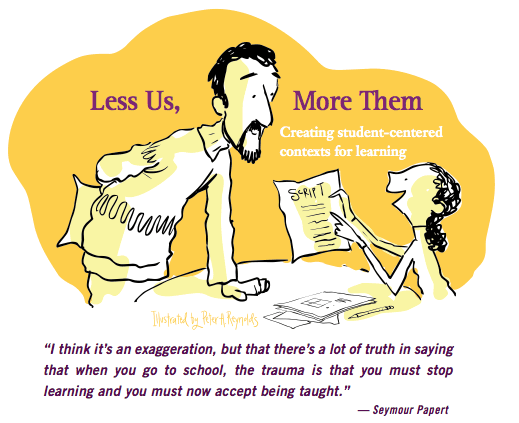 I am fortunate to be invited to work in schools all over the world. Regardless of the setting, I find myself leaving educators I meet with the same four words of advice, “Less Us, More Them!”
I am fortunate to be invited to work in schools all over the world. Regardless of the setting, I find myself leaving educators I meet with the same four words of advice, “Less Us, More Them!”
Knowledge is a consequence of experience. Understanding is the result of existing knowledge accommodating and explaining new experiences. If we focus on a handful of powerful ideas, students learn more. The role of the teacher is to create and facilitate powerful, productive contexts for learning.
Education policy often confuses teaching and learning. Learning is not the direct result of having been taught. If you have spent any time working with learners, you know that you can’t simply talk at them, or do something to them, and expect that they have learned anything. A robot can deliver curriculum; great teachers provide much more.
Young people have a remarkable capacity for intensity, but need their teachers to craft learning environments that reduce stress levels, interruptions, and confusion. When a teacher creates a well–designed prompt that capitalizes on student curiosity, kids can embark on complex, long-term learning adventures.
Inquiry begins with what students want to know… the things they wonder about and that drive their desire to learn. When we build off this natural phenomenon, we support learners along the path to knowledge and understanding without expecting a right answer. Successful learning expeditions use the curriculum as the buoy, not the boat.
“Less Us, More Them” (LUMT) doesn’t exempt teachers from the learning process, or minimize the importance of their expertise within in the learning environment. LUMT raises expectations and standards in our classrooms by granting more responsibility to the learner. In this environment, it is natural to expect kids to look up unfamiliar words, proofread, and contribute resources for class discussion without prodding from the teacher.
To start making your classroom more student-centered, demonstrate a concept and then ask students to do something. Walk around and support them. Bring the group together to celebrate an accomplishment or seize the next teachable moment. We need to operate as if students own the time in our classrooms, not us. Kids rise to the occasion if we let them. When students own the learning process, they also own the knowledge they construct. Self-reliance results when we relinquish control and power to our students.
If you wanted to become a carpenter, you would spend time with great carpenters. Teachers serve as effective mentors when their apprentices – students – observe their continuous growth and learn by example.
Piaget suggests that it is not the role of the teacher to correct a child from the outside, but to create conditions in which the student corrects himself. Whenever you are about to intervene on behalf of a teachable moment, pause and ask yourself, “Is there a way I can shift more agency to the learner?”
This article appeared in the Fall 2011 issue of The Creative Educator. Download the entire issue in PDF form here.
Veteran educator Gary Stager, Ph.D. is the author of Twenty Things to Do with a Computer – Forward 50, co-author of Invent To Learn — Making, Tinkering, and Engineering in the Classroom, publisher at Constructing Modern Knowledge Press, and the founder of the Constructing Modern Knowledge summer institute. He led professional development in the world’s first 1:1 laptop schools thirty years ago and designed one of the oldest online graduate school programs. Gary is also the curator of The Seymour Papert archives at DailyPapert.com. Learn more about Gary here.
